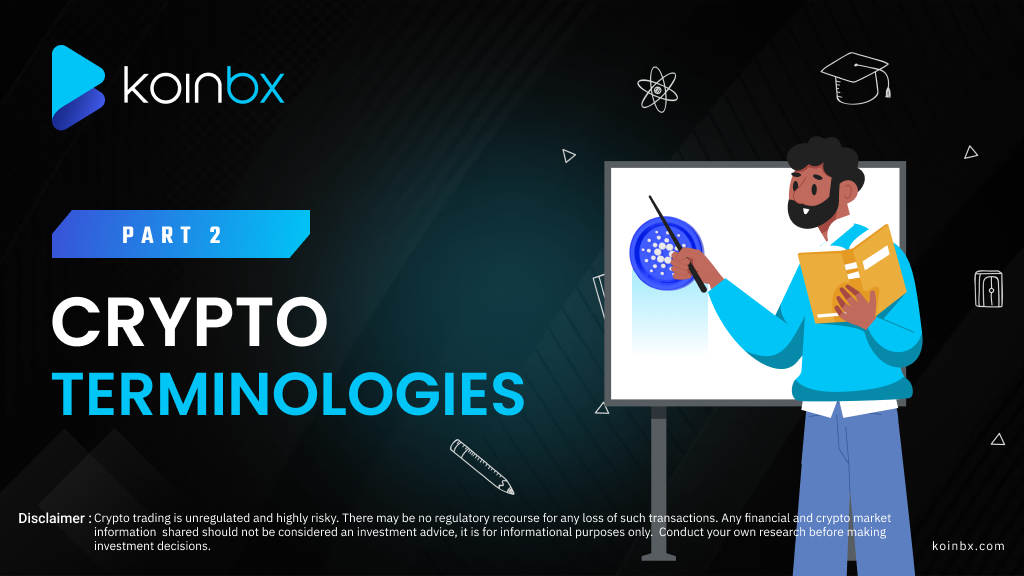It's essential to familiarize ourselves with additional key terms that will help you navigate the crypto environment. In this second part, we will explore important concepts ranging from wallets to proof mechanisms. Understanding these terms will further empower your decision-making as you engage with the crypto world.
Before diving into Part 2, if you haven't seen Part 1, click here >> Key crypto terminologies part 1
N
NFT
A Non-Fungible Token (NFT) is a unique digital asset that represents ownership of a specific item or piece of content, such as art, music, or virtual real estate. It's unique and cannot be interchangeable.
Network fees
Network fees are the costs incurred when executing transactions on a blockchain. These fees incentivize miners or validators to process and validate transactions, ensuring timely and secure transfers of assets within the network.
Node
A node is a computer that participates in a blockchain network by maintaining a copy of the blockchain and validating transactions. Nodes play a critical role in ensuring the decentralization and security of the network.
o
Order Book
An order book is a digital ledger that lists all buy and sell orders for a particular crypto on an exchange. It shows the quantity of the asset being offered and the price at which traders are willing to buy or sell. The order book provides a transparent view of market depth and liquidity, helping traders make informed decisions.
P
Paper wallet
A paper wallet is a physical document containing a public address and its corresponding private key. It serves as a secure way to store crypto assets offline.
Private key
A private key, also known as a secret key, is a secret alphanumeric code that allows users to access and manage their crypto assets.
Proof-of-stake
Proof-of-Stake is a consensus mechanism that allows validators to create new blocks and confirm transactions based on the number of coins they hold and are willing to "stake" as collateral. PoS is considered more energy-efficient than Proof-of-Work.
Proof-of-work
Proof-of-Work is a consensus algorithm used to validate transactions and add new blocks to a blockchain. Proof-of-Work systems rely on a mining process to maintain the network.
Public key
A public key is a cryptographic code that allows users to receive crypto assets. It is paired to a private key and can be shared with others to facilitate transactions, while the private key must remain confidential.
S
Sats or Satoshis
Satoshis, often abbreviated as "sats," are the smallest units of Bitcoin, with one Bitcoin equal to 100 million satoshis.
SegWit
Segregated Witness (SegWit) is a protocol upgrade for Bitcoin that separates transaction signatures from the transaction data, allowing for more transactions to be included in each block.
SHA-256
SHA-256 (Secure Hash Algorithm 256-bit) is a cryptographic hash function widely used in blockchain, particularly in Bitcoin mining. It produces a fixed-size hash output from variable input data, ensuring data integrity and security.
Smart Contracts
Smart contracts are self-executing contracts with the terms of the agreement directly written into code. They run on blockchain networks and automatically execute actions when predetermined conditions are met, eliminating the need for intermediaries.
Solidity
Solidity is a programming language used for writing smart contracts on the Ethereum blockchain. It is designed to facilitate the development of decentralized applications (dApps).
T
Testnet
A testnet is a separate blockchain network that mimics the main blockchain but uses test tokens instead of real crypto assets. It allows developers to test and debug applications without risking actual funds.
Token
A token is a digital asset created on a blockchain, often representing various assets or utilities. Tokens can be fungible (like crypto assets) or non-fungible (like NFTs) and serve a variety of purposes within decentralized applications.
U
UTXO
Unspent Transaction Output (UTXO) refers to the output of a blockchain transaction that has not been spent. UTXOs are fundamental to Bitcoin's transaction model, as they represent available coins that can be used in future transactions.
V
Validators
Validators are participants in a blockchain network who confirm transactions and maintain the network's security. In Proof-of-Stake systems, they are chosen based on the amount of cryptocurrency they hold and are willing to stake.
Volatility
Volatility refers to the degree of price fluctuation in the cryptocurrency market. High volatility can present both opportunities and risks for traders and investors, as prices can change dramatically in a short period.
W
Wallet
A wallet is a software or hardware tool that allows users to store, send, and receive cryptocurrencies. Wallets can be hot (connected to the internet) or cold (offline), with cold wallets generally offering greater security.
Whale
A whale is a term used to describe an individual or entity that holds a large amount of cryptocurrency. Whales can significantly influence market movements due to their ability to execute large trades that impact supply and demand.
White Paper
A white paper is a detailed document released by a crypto project that outlines its objectives, technology, and use case. It serves as a foundational resource for potential investors, providing insights into the project's goals and how it plans to achieve them.
Download KoinBX Android App | Download KoinBX iOS App
Disclaimer: Any financial and crypto market information shared should not be considered investment advice. It is for informational purposes only. Conduct your own research before making investment decisions. Crypto trading is unregulated and highly risky. There may be no regulatory recourse for any loss of such transactions.






Comments